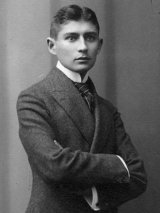The Trial Page #6
The Trial is a novel written by Franz Kafka between 1914 and 1915 and published posthumously on 26 April 1925. One of his best-known works, it tells the story of Josef K., a man arrested and prosecuted by a remote, inaccessible authority, with the nature of his crime revealed neither to him nor to the reader. Heavily influenced by Dostoevsky's Crime and Punishment and The Brothers Karamazov, Kafka even went so far as to call Dostoevsky a blood relative. Like Kafka's other novels, The Trial was never completed, although it does include a chapter which appears to bring the story to an intentionally abrupt ending.
He could have gone directly to his room, but as he wanted to speak with Mrs. Grubach he went straight to her door and knocked. She was sat at the table with a knitted stocking and a pile of old stockings in front of her. K. apologised, a little embarrassed at coming so late, but Mrs. Grubach was very friendly and did not want to hear any apology, she was always ready to speak to him, he knew very well that he was her best and her favourite tenant. K. looked round the room, it looked exactly as it usually did, the breakfast dishes, which had been on the table by the window that morning, had already been cleared away. "A woman's hands will do many things when no-one's looking," he thought, he might himself have smashed all the dishes on the spot but certainly would not have been able to carry it all out. He looked at Mrs. Grubach with some gratitude. "Why are you working so late?" he asked. They were now both sitting at the table, and K. now and then sank his hands into the pile of stockings. "There's a lot of work to do," she said, "during the day I belong to the tenants; if I'm to sort out my own things there are only the evenings left to me." "I fear I may have caused you some exceptional work today." "How do you mean, Mr. K.?" she asked, becoming more interested and leaving her work in her lap. "I mean the men who were here this morning." "Oh, I see," she said, and went peacefully back to what she was doing, "that was no trouble, not especially." K. looked on in silence as she took up the knitted stocking once more. She seems surprised at my mentioning it, he thought, she seems to think it's improper for me to mention it. All the more important for me to do so. An old woman is the only person I can speak about it with. "But it must have caused some work for you," he said then, "but it won't happen again." "No, it can't happen again," she agreed, and smiled at K. in a way that was almost pained. "Do you mean that seriously?" asked K. "Yes," she said, more gently, "but the important thing is you mustn't take it too hard. There are so many awful things happening in the world! As you're being so honest with me, Mr. K., I can admit to you that I listened to a little of what was going on from behind the door, and that those two policemen told me one or two things as well. It's all to do with your happiness, and that's something that's quite close to my heart, perhaps more than it should be as I am, after all, only your landlady. Anyway, so I heard one or two things but I can't really say that it's about anything very serious. No. You have been arrested, but it's not in the same way as when they arrest a thief. If you're arrested in the same way as a thief, then it's bad, but an arrest like this ... . It seems to me that it's something very complicated - forgive me if I'm saying something stupid - something very complicated that I don't understand, but something that you don't really need to understand anyway." "There's nothing stupid about what you've said, Mrs. Grubach, or at least I partly agree with you, only, the way I judge the whole thing is harsher than yours, and think it's not only not something complicated but simply a fuss about nothing. I was just caught unawares, that's what happened. If I had got up as soon as I was awake without letting myself get confused because Anna wasn't there, if I'd got up and paid no regard to anyone who might have been in my way and come straight to you, if I'd done something like having my breakfast in the kitchen as an exception, asked you to bring my clothes from my room, in short, if I had behaved sensibly then nothing more would have happened, everything that was waiting to happen would have been stifled. People are so often unprepared. In the bank, for example, I am well prepared, nothing of this sort could possibly happen to me there, I have my own assistant there, there are telephones for internal and external calls in front of me on the desk, I continually receive visits from people, representatives, officials, but besides that, and most importantly, I'm always occupied with my work, that's to say I'm always alert, it would even be a pleasure for me to find myself faced with something of that sort. But now it's over with, and I didn't really even want to talk about it any more, only I wanted to hear what you, as a sensible woman, thought about it all, and I'm very glad to hear that we're in agreement. But now you must give me your hand, an agreement of this sort needs to be confirmed with a handshake." Will she shake hands with me? The supervisor didn't shake hands, he thought, and looked at the woman differently from before, examining her. She stood up, as he had also stood up, and was a little self- conscious, she hadn't been able to understand everything that K. said. As a result of this self consciousness she said something that she certainly did not intend and certainly was not appropriate. "Don't take it so hard, Mr. K.," she said, with tears in her voice and also, of course, forgetting the handshake. "I didn't know I was taking it hard," said K., feeling suddenly tired and seeing that if this woman did agree with him it was of very little value. Before going out the door he asked, "Is Miss Bürstner home?" "No," said Mrs. Grubach, smiling as she gave this simple piece of information, saying something sensible at last. "She's at the theatre. Did you want to see her? Should I give her a message?" "I, er, I just wanted to have a few words with her." "I'm afraid I don't know when she's coming in; she usually gets back late when she's been to the theatre." "It really doesn't matter," said K. his head hanging as he turned to the door to leave, "I just wanted to give her my apology for taking over her room today." "There's no need for that, Mr. K., you're too conscientious, the young lady doesn't know anything about it, she hasn't been home since early this morning and everything's been tidied up again, you can see for yourself." And she opened the door to Miss Bürstner's room. "Thank you, I'll take your word for it," said K, but went nonetheless over to the open door. The moon shone quietly into the unlit room. As far as could be seen, everything was indeed in its place, not even the blouse was hanging on the window handle. The pillows on the bed looked remarkably plump as they lay half in the moonlight. "Miss Bürstner often comes home late," said K., looking at Mrs. Grubach as if that were her responsibility. "That's how young people are!" said Mrs. Grubach to excuse herself. "Of course, of course," said K., "but it can be taken too far." "Yes, it can be," said Mrs. Grubach, "you're so right, Mr. K. Perhaps it is in this case. I certainly wouldn't want to say anything nasty about Miss Bürstner, she is a good, sweet girl, friendly, tidy, punctual, works hard, I appreciate all that very much, but one thing is true, she ought to have more pride, be a bit less forthcoming. Twice this month already, in the street over the way, I've seen her with a different gentleman. I really don't like saying this, you're the only one I've said this to, Mr. K., I swear to God, but I'm going to have no choice but to have a few words with Miss Bürstner about it myself. And it's not the only thing about her that I'm worried about." "Mrs. Grubach, you are on quite the wrong track," said K., so angry that he was hardly able to hide it, "and you have moreover misunderstood what I was saying about Miss Bürstner, that is not what I meant. In fact I warn you quite directly not to say anything to her, you are quite mistaken, I know Miss Bürstner very well and there is no truth at all in what you say. And what's more, perhaps I'm going to far, I don't want to get in your way, say to her whatever you see fit. Good night." "Mr. K.," said Mrs. Grubach as if asking him for something and hurrying to his door which he had already opened, "I don't want to speak to Miss Bürstner at all, not yet, of course I'll continue to keep an eye on her but you're the only one I've told what I know. And it is, after all something that everyone who lets rooms has to do if she's to keep the house decent, that's all I'm trying to do." "Decent!" called out K. through the crack in the door, "if you want to keep the house decent you'll first have to give me notice." Then he slammed the door shut, there was a gentle knocking to which he paid no more attention.
Translation
Translate and read this book in other languages:
Select another language:
- - Select -
- 简体中文 (Chinese - Simplified)
- 繁體中文 (Chinese - Traditional)
- Español (Spanish)
- Esperanto (Esperanto)
- 日本語 (Japanese)
- Português (Portuguese)
- Deutsch (German)
- العربية (Arabic)
- Français (French)
- Русский (Russian)
- ಕನ್ನಡ (Kannada)
- 한국어 (Korean)
- עברית (Hebrew)
- Gaeilge (Irish)
- Українська (Ukrainian)
- اردو (Urdu)
- Magyar (Hungarian)
- मानक हिन्दी (Hindi)
- Indonesia (Indonesian)
- Italiano (Italian)
- தமிழ் (Tamil)
- Türkçe (Turkish)
- తెలుగు (Telugu)
- ภาษาไทย (Thai)
- Tiếng Việt (Vietnamese)
- Čeština (Czech)
- Polski (Polish)
- Bahasa Indonesia (Indonesian)
- Românește (Romanian)
- Nederlands (Dutch)
- Ελληνικά (Greek)
- Latinum (Latin)
- Svenska (Swedish)
- Dansk (Danish)
- Suomi (Finnish)
- فارسی (Persian)
- ייִדיש (Yiddish)
- հայերեն (Armenian)
- Norsk (Norwegian)
- English (English)
Citation
Use the citation below to add this book to your bibliography:
Style:MLAChicagoAPA
"The Trial Books." Literature.com. STANDS4 LLC, 2025. Web. 23 Feb. 2025. <https://www.literature.com/book/the_trial_1052>.








Discuss this The Trial book with the community:
Report Comment
We're doing our best to make sure our content is useful, accurate and safe.
If by any chance you spot an inappropriate comment while navigating through our website please use this form to let us know, and we'll take care of it shortly.
Attachment
You need to be logged in to favorite.
Log In